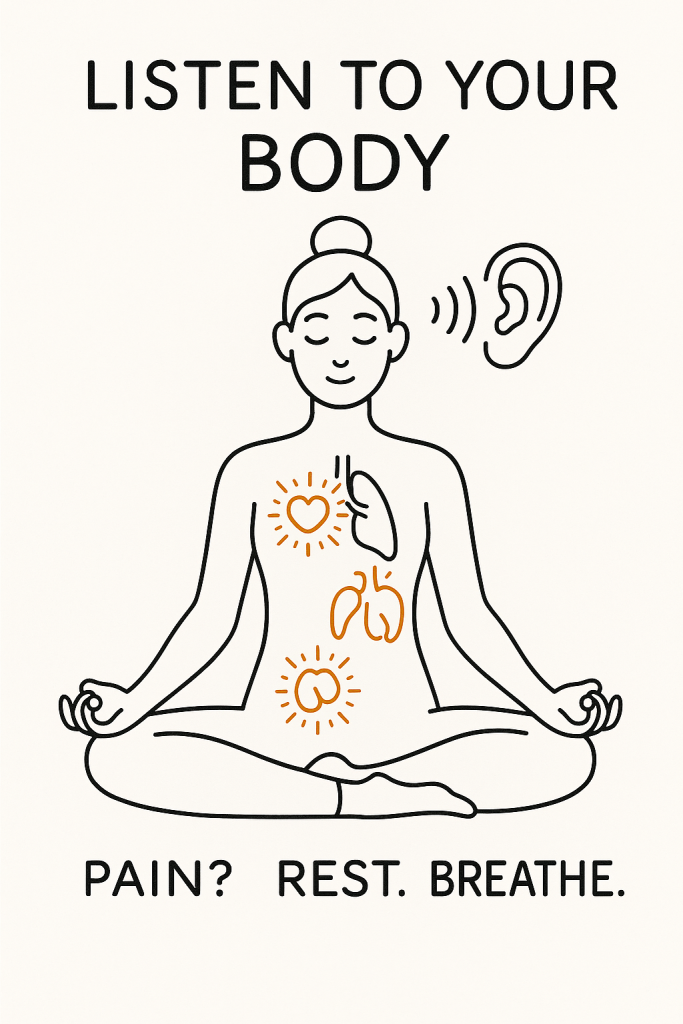Listening to your body means paying attention to signals—even subtle ones—that your system may send and that can alert you to illnesses best detected early so they can be treated or managed.
These signals can also motivate change and guide you toward better habits. When your body responds positively to your efforts, be proud and pleased, and use that boost to keep going.
Monitor your energy level
Unusual, persistent fatigue may point to a thyroid issue, anemia, diabetes, or a heart condition. Shortness of breath during exertion may be related to the heart, the lungs, or excess weight.
Pay attention to pain
Pain often indicates a problem that needs to be addressed; otherwise, it may worsen without action. See a doctor to explore the causes rather than keeping quiet about it.

Track your measurements and how they change over time
Your weight: If you gain or lose a few kilograms in two weeks, monitor it; this may signal a hormonal, cardiac, digestive, or metabolic problem.
Your Body Mass Index (BMI): BMI = weight in kg ÷ (height in meters)². Example: 90 kg and 1.8 m → 90/(1.8)² = 28 → overweight. A BMI between 19 and 25 is recommended. Above 25 you are overweight. Above 30 you are obese, with increased risk of diabetes, hypertension, and cardiovascular disease.
Your waist circumference: This reflects abdominal fat and is a marker of cardiovascular risk. Measure with a flexible tape at navel level after a normal exhalation. Thresholds to watch:
Men: ideal waist circumference < 94 cm; high 94–102 cm; very high > 102 cm.
Women: ideal waist circumference < 80 cm; high 80–88 cm; very high > 88 cm.
Your waist-to-hip ratio (WHR): Calculate by dividing waist circumference by hip circumference. Cardiovascular risk increases if the ration is above 1 for men and 0.85 for women.
Your neck circumference: Also useful, as it indicates sleep-apnea risk if neck size is > 43 cm in men or > 38 cm in women.
Observe your natural functions
Monitor your bowel movements
See a clinician if:
* You have blood in your stool.
* Constipation lasts several days.
* Diarrhea lasts several days.
Monitor your urine
Seek medical advice if:
* You need to urinate very frequently (e.g., hourly).
* You feel burning when urinating.
* There is blood in your urine.
* As a man, your urinary stream is weakened.
Be attentive to your senses, memory, and cognition
* Vision: See an ophthalmologist if your sight suddenly worsens or spots appear.
* Hearing: If conversations are difficult to follow, get screened for age-related hearing loss (presbycusis).
* Memory: If you notice new issues concentrating or remembering, consult a doctor.
Watch for changes in your body and how it functions
Unusual symptoms that appear and persist for several days warrant attention:
* Loss of appetite
* Prolonged fever
* Persistent cough
* Ongoing headache
* Dizziness
* Skin wounds or spots that don’t heal
* A mole that grows irregularly or shows multiple colors, etc.
For women:
* Hot flashes, unusual dryness, or joint pain can be signs of menopause.
* Regular breast self-exams help ensure there’s no lump or discharge that should be checked.
Take heart from the benefits of your changes
If you’ve chosen to read this book, you want to adopt new behaviors that do you good. When you adopt beneficial habits and practice them long enough with discipline, you should notice positive effects on your body and how it functions.
For example, if you’ve tuned your sleep so you wake naturally, or you’ve started exercising regularly, after a few weeks you should have more energy upon waking. Likewise, after a few weeks of eating less sugar and smoothing your blood-glucose curve, you shouldn’t feel post-meal fatigue or between-meal cravings. Another example: if you’ve adjusted your diet, reduced alcohol intake, and begun regular exercise, you should notice your liver decreasing in size and a modest weight loss each month.
It’s important for morale to notice your body’s improvements. Listening to your body—and feeling it get better—also helps validate your choices and shows where to focus and step up your efforts.
